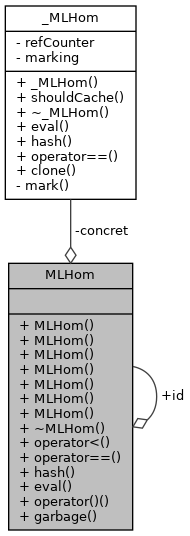#include <MLHom.h>

Public Member Functions | |
| MLHom () | |
| Default public constructor. | |
| MLHom (const GHom &h) | |
| MLHom (const GHom &up, const MLHom &down) | |
| MLHom (const _MLHom &) | |
| MLHom (_MLHom *) | |
| MLHom (const _MLHom *) | |
| MLHom (int var, int val, const MLHom &h=MLHom::id) | |
| Create variable/value pair and left concatenate to a homomorphism. | |
| virtual | ~MLHom () |
| bool | operator< (const MLHom &h) const |
| bool | operator== (const MLHom &h) const |
| size_t | hash () const |
| Hash key computation. | |
| HomNodeMap | eval (const GDDD &d) const |
| The computation function responsible for evaluation over a node. | |
| HomNodeMap | operator() (const GDDD &) const |
| cache calls to eval | |
Static Public Member Functions | |
| static void | garbage () |
| Collects and destroys unused homomorphisms. | |
Static Public Attributes | |
| static const MLHom | id |
| Elementary homomorphism Identity, defined as a constant. | |
Private Attributes | |
| const _MLHom * | concret |
| The real implementation class. | |
Friends | |
| MLHom | operator+ (const MLHom &, const MLHom &) |
| By definition, as homomorphism are linear, (h+g) (d) = h(d) + g(d) ;. | |
Constructor & Destructor Documentation
◆ MLHom() [1/7]
|
inline |
◆ MLHom() [2/7]
| MLHom::MLHom | ( | const GHom & | h | ) |
◆ MLHom() [3/7]
◆ MLHom() [4/7]
| MLHom::MLHom | ( | const _MLHom & | h | ) |
◆ MLHom() [5/7]
| MLHom::MLHom | ( | _MLHom * | ) |
◆ MLHom() [6/7]
| MLHom::MLHom | ( | const _MLHom * | h | ) |
◆ MLHom() [7/7]
Create variable/value pair and left concatenate to a homomorphism.
h(var,val,g) (d) = DDD(var,val) ^ g(d). In other words : var – val -> g
- Parameters
-
var the variable index val the value associated to the variable h the homomorphism to apply on successor node. Default is identity, so is equivalent to a left concatenation of a DDD(var,val).
◆ ~MLHom()
|
virtual |
Member Function Documentation
◆ eval()
| HomNodeMap MLHom::eval | ( | const GDDD & | d | ) | const |
The computation function responsible for evaluation over a node.
Users should not directly use this. Normal behavior is to use operator() that encapsulates this call with operation caching.
References concret, and _MLHom::eval().
◆ garbage()
|
static |
Collects and destroys unused homomorphisms.
Do not call this directly but through MemoryManager::garbage() as order of calls (among GSDD::garbage(), GShom::garbage(), SDED::garbage()) is important.
References canonical, MLCache< MLHomType, NodeType, HomNodeMapType >::clear(), _MLHom::marking, and nsMLHom::mlcache.
Referenced by MemoryManager::garbage().
◆ hash()
|
inline |
Hash key computation.
It is essential for good hash table operation that the spread of the keys be as good as possible. Also, fast hash key computation is a good design goal. Note that bad hash functions will yield more collisions, thus equality comparisons which may be quite costly.
References concret, and ddd::knuth32_hash().
Referenced by MLHomAdapter::hash(), nsMLHom::ConstantUp::hash(), and nsMLHom::LeftConcat::hash().
◆ operator()()
| HomNodeMap MLHom::operator() | ( | const GDDD & | d | ) | const |
cache calls to eval
References MLCache< MLHomType, NodeType, HomNodeMapType >::insert(), and nsMLHom::mlcache.
◆ operator<()
◆ operator==()
Friends And Related Symbol Documentation
◆ operator+
By definition, as homomorphism are linear, (h+g) (d) = h(d) + g(d) ;.
Where g,h are homomorphisms and d is a DDD.
This commutative operation computes a homomorphism that evaluates as the sum of two homomorphism.
Semantics : (h1 + h2) (d) = h1(d) + h2(d).
Member Data Documentation
◆ concret
|
private |
The real implementation class.
All true operations are delagated on this pointer. Construction/destruction take care of ensuring concret is only instantiated once in memory.
Referenced by eval(), hash(), operator<(), and operator==().
◆ id
|
static |
The documentation for this class was generated from the following files:
 1.9.8
1.9.8